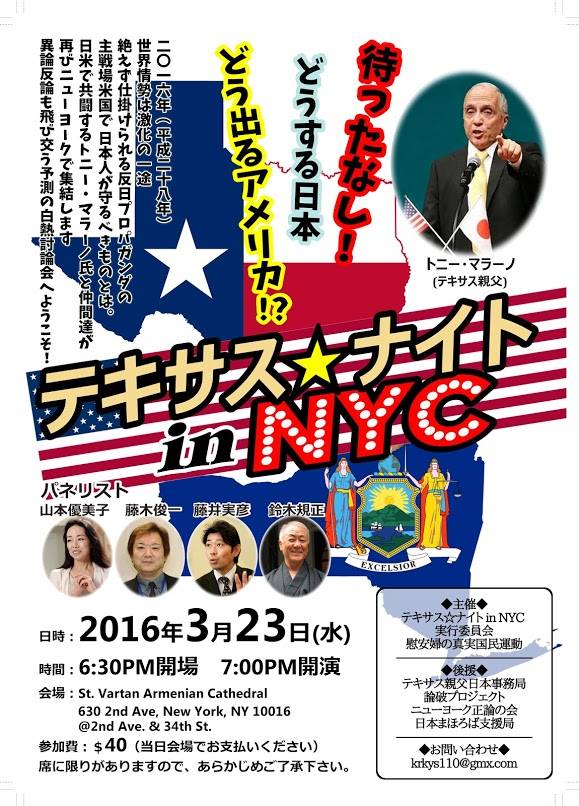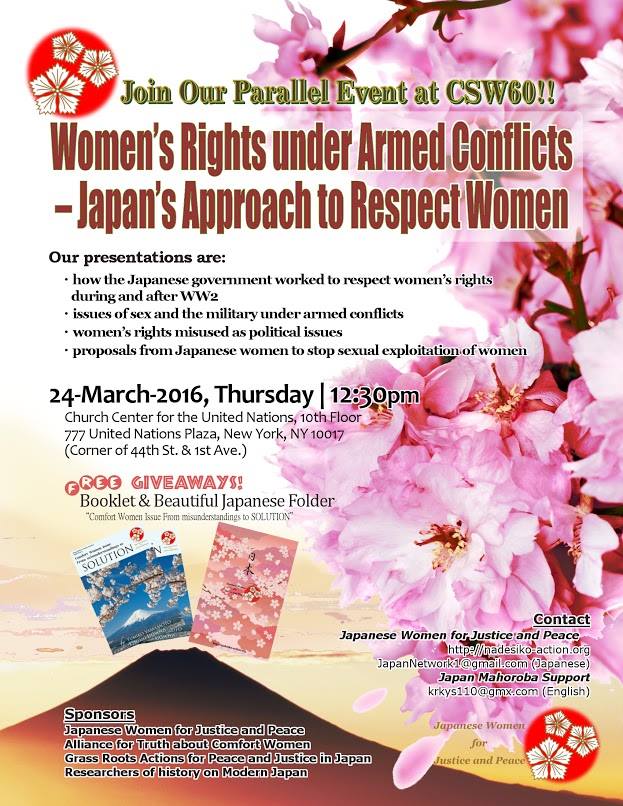慰安婦=性奴隷説に利用されている日本人慰安婦がいます。
海外で 「I was their ‘slave’. 私は彼ら(日本軍)の奴隷でした」と宣伝されている「城田すず子」さん(故人)です。
中国・韓国・日本などで共同申請する可能性がある「慰安婦性奴隷 ユネスコ記憶遺産」に利用されかねません。
「城田さん=性奴隷」の基になっているのが、
・千葉県館山市にある「噫(ああ)従軍慰安婦」石碑(NPO安房文化遺産フォーラム)
・ラジオドキュメント番組「石の叫び~ある従軍慰安婦の記録」(1986年TBSラジオ放送)第12回放送文化基金賞奨励賞
です。
城田さんが「慰安婦=性奴隷説」に利用されるのを阻止するために、安房文化遺産フォーラム、TBSラジオに対し「”城田すず子さんの原文”を公開し、“吉田清治氏~虚偽の作り話”であることを注記」することを求める署名を有志が始めました。
皆様のご協力よろしくお願い申し上げます。
<参考資料>
・造られた性奴隷の象徴~日本人慰安婦「城田すず子」さん
・月刊正論2014年5月号 元日本人慰安婦を「性奴隷」にした嫌らしい面々 大高未貴
*******************************************************************
“城田すず子さんの原文”を公開し、
“吉田清治氏~虚偽の作り話”であることを注記せよ
署名はこちらから
↓↓↓↓↓↓↓↓↓↓
https://goo.gl/iiWswM

署名主催:捏造慰安婦問題草の根会
宛先: 安房文化遺産フォーラム、TBSラジオ
<請願文>
日本 城田すず子 “私は彼らの奴隷でした。” ”債務肩代わりのため父親により日本軍へ売られ、終戦まで、彼女は台湾、サイパンの慰安所で性奴隷として働いた。1955年から20年間、性暴力被害者の収容施設に暮らし、1971年慰安婦時代の手記を著わした。 ”
これが、元慰安婦、元GI売春婦(パンパン)であった城田すず子さんの海外における紹介文です。
しかしこれは城田さんの実像でしょうか。
疑問を抱く理由を挙げれば、親が売った先は売春業者であり日本軍ではありませんし、高額な報酬を得ていた慰安婦は「奴隷」とは言えません。彼女は1971年「マリアの賛歌」という手記を出版しましたが、慰安婦部分の記述はわずかであり、戦時下という状況に照らせば、格別数奇な境遇にあったとは読み取れず、債務返済のため日本軍慰安婦として働いた、というただそれだけのことが書かれていると言っても過言ではありません。
ことさらに同著作物を慰安婦時代の手記と位置付けるのは本の内容を無視しているとさえ言えます。
ましてや、日本軍の奴隷であったなどということはどこからも読み取れません。
「奴隷」という表現を使うなら、むしろ心身ともにすさんだ戦後のGI相手の売春婦時代の方が適していると思われます。
参照:城田すず子―造られた慰安婦像― http://nadesiko-action.org/?p=9952
城田さんの著作物を正確に読めば、冒頭の紹介がいかに城田さんの実像から乖離しているかがすぐにわかります。それはなによりも城田さんの著作物を侮辱する事であり、日本軍の奴隷であったなどと言う虚像を紹介することは彼女の尊厳を傷つけることを意味します。又、城田さんが恋心を抱いた日本兵、親せきや知人の中にもおられたであろう軍人や兵隊さん、その方達も含め、日本軍の名誉を貶めることにもなります。
ところが、1985年突如として城田さん自身が自己の著作物を侮辱し、自己の尊厳を傷つけ、知人友人を貶める一文を発表したのです。翌1986年、それはTBSラジオで放送されました。いわゆる「石の叫び」です。冒頭の海外での紹介の基になっているのがこの「石の叫び」です。
しかし、これは本当に彼女の手になるものでしょうか。
あまりの乖離と違和感は前述の通りです。
1、安房文化遺産フォーラム(特定非営利活動法人NPO)宛て
貴フォーラムのホームページ(そして恐らく貴法人の本部である小高記念館の展示物)に、1986年、TBSラジオで放送された「石の叫び―ある従軍慰安婦の叫び」の文字起こし文が掲載されています。http://bunka-isan.awa.jp/About/item.htm?iid=413
貴法人の名称から推察すると、貴法人は同放送内容を“安房文化遺産”として登録し、これを一般に広めることを意図して掲載したものと思われます。とすれば、貴法人は“安房文化遺産”登録のための同放送内容について独自の検証をされているはずです。当会は本署名運動の賛同者と共に、その検証結果をお尋ねするとともに、同放送内容の一部は現在明らかに誤りであったこと等を踏まえ、次の通り要求します。
1)吉田清治氏については、同氏の著作物も含め、いわゆる吉田証言は作り話であることを本人も認めています(1996年5月2・9日付の週刊新潮インタビュー)。吉田証言が虚偽であったことは朝日新聞社も認め謝罪しています(2014年8月)。
従って、貴フォーラムのホームページ(及び展示物)上においてもTBS放送の吉田清治氏インタビュー部分は「虚偽の作り話」であった旨、注記すること。
2)以下の部分は城田さんの発言の中で最も重要な部分です。ところが、せっかくのインタビューであるにも関わらず、この最重要部分は城田さんの肉声ではなく、ナレーターによるナレーションになっています。そのことを注記すること。
「兵隊さんや民間人のことは各地で祭られるけど、中国、東南アジア、南洋諸島、アリューシャン列島で、性の提供をさせられた娘たちは、さんざん弄ばされて、足手まといになると、放り出され、荒野をさまよい、凍りつくサイムで飢え、野良犬か狼の餌になり、骨はさらされ土になった。兵隊さんは一回五十銭か一円の切符で行列をつくり、女は洗うひまもなく相手させられ・・て、なんど兵隊の首をしめようと思ったことか、半狂乱でした。死ねばジャングルの穴にほうりこまれ、親元に知らせる術もない有様です。それを私は見たのです。この眼で、女の地獄を・・・」
3)海外で紹介されている「性奴隷城田さん」は上述のナレーション部分が根拠になっていると思われます。この一文は城田さんの世話人であった深津文雄氏に宛てた手紙がその原文であると言われていますが、その所在は明らかになっていません。内容及び文体とも、それまでの城田さんの言動とは異質なものであることが識者等に指摘されていること、又、なによりも突如として出現したことを考え合わせると、この一文が本当に城田さんのものであるかどうか真偽不明と言わざるを得ません。
貴フォーラムにおかれては、“安房文化遺産”として紹介されている以上、きちんと検証されているものと思われますので、その結果及び城田さんの手紙の所在・内容について注記すること。
2、TBSラジオ宛て
1)1986年ラジオで放送された「石の叫び―ある従軍慰安婦の叫び」の中の吉田清治氏の発言は作り話であることが判明しており、朝日新聞社同様に、謝罪すること。
2)第12回放送文化基金賞奨励賞を返還すること。
3)せっかくのインタビューの機会にもかかわらず、1、安房文化遺産フォーラム(特定非営利活動法人NPO)宛ての2)の「 」部分が城田さんの肉声ではなく、ナレーターによるナレーションにした理由を説明すること。
以上
*******************************************************************


